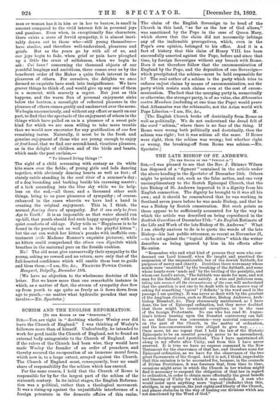SCHISM AND THE ENGLISH REFORMATION.
To THE EDITOR OF THE "SpiecTAToi."1 Six,—You are right in "doubting whether Wesley ever did leave the Church of England." I was thinking of Wesley's followers more than of himself. Undoubtedly, he intended to work for good inside the Church of England, not to found an external body antagonistic to the Church of England. And if the rulers of the Church had been wise, they would have made Wesley the founder of an order of preachers, and thereby secured the co-operation of an immense moral force, which now is, to a large extent, arrayed against the Church. The Church of England must, consequently, bear no small share of responsibility for the schism which has ensued.
For the same reason, I hold that the Church of Rome is responsible for by far the largest part of the schism of the sixteenth century. In its initial stages, the English Reforma- tion was a political, rather than a theological movement. It was a rising-up against the unjustifiable interference of a foreign potentate in the domestic affairs of this realm. The claim of the English Sovereign to be head of the Church in this land, "as far as the law of God allows," was sanctioned by the Pope in the case of Queen Mary, which shows that the claim did not necessarily infringe any of the inalienable prerogatives, which, even in the Pope's own opinion, belonged to his office. And it is a fact of history that this claim of Henry VIII. has been successfully asserted against the Pope, before and since that time, by foreign Sovereigns without any breach with Rome. Does it not therefore follow that the excommunication of England by the Pope, and the deposition of one Sovereign— which precipitated the schism—must be held responsible for it? The real author of a schism is the party which tries to enforce unjust claims by means of excommunication, not the party which resists such claims even at the cost of excom- munication. The fact that the usurping party is, numerically or otherwise, the stronger party, is of no value, else Athanasius contra Mundum (including at one time the Pope) would prove that Athanasius was the schismatic, not the Arian world with Pope Liberius.—I am, Sir, &c., M.
[The English Church broke off doctrinally from Rome as well as politically. We do not understand the dread felt of the word "schism," where there is no fear of the thing. If Rome were wrong both politically and doctrinally, then the schism was right ; but it was schism all the same. If Rome were right, then the schism was wrong; but whether right, or wrong, the breaking-off from Rome was schism.—En. Spectator.]


































 Previous page
Previous page